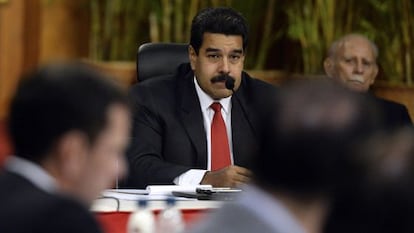Accusations fly during marathon talks between Maduro and opposition
Historic discussions aimed at defusing Venezuela unrest and violence take place in Caracas No agreements reached, but government will meet again with dissenting parties next week

Venezuelan President Nicolás Maduro and 10 opposition leaders on Friday concluded their first formal round of talks aimed at defusing the violent unrest that has paralyzed the nation for two months.
As expected, no agreements were reached following the six-hour session that was televised live and ended after 1am Venezuelan time. Maduro announced that a special government delegation headed by Vice President Jorge Arreza would meet again with the opposition on Tuesday.
There were some tense moments during the meeting, with both sides lodging accusations at one another.
The embattled president remained firm in his commitment to “carry out the revolution” started by his predecessor Hugo Chávez, who died from cancer last year.
“It can’t be that every time there is a social or economic problem in this country, the opposition wants to overthrow the government,” Maduro said during one of his five interventions in the talks.
Henrique Capriles, the governor of Miranda state who lost to Maduro in last year's presidential election and has been challenging that defeat, said the country “has changed” since the April 14 vote, “and you don’t want to recognize it.”
None of you want to admit that there is a political crisis” President Maduro
“None of you want to admit that there is a political crisis,” Capriles said. “Nicolás, you were able to get where you are today because of the control you all have on the institutions. And you know that, the entire country knows that. But we now want to resolve this crisis. Why? Because if this situation gets worse, it is going to set off a military coup or a social explosion – something we don’t want.”
Besides the foreign ministers of Ecuador, Colombia and Brazil, the Vatican also acted as a mediator in the talks. Papal Nuncio Aldo Giordano read a letter from Pope Francis asking both sides to “recognize their differences.”
“Unity will prevail over conflicts,” the pope said.
Maduro headed the nine-member government delegation. Among the issues brought up were the country’s soaring crime rate, division of governmental powers, constitutional guarantees and amnesty for opposition leaders and protestors who have been arrested and jailed for the last two months.
This latter issue has been a sticking point for the Maduro government, which has refused to release Leopoldo López, the leader of the opposition People’s Will (VP) party, who is in jail on charges of inciting unrest and criminal association.
VP leaders, who had set down the amnesty as a condition for the talks, refused to take part in the negotiations that began on Thursday night.
“There is time for justice and for pardoning, it is now the time for justice,” Maduro said.
López will face a probable cause hearing on May 8, a judge said on Thursday.
The nationwide violence that began on February 12 has claimed at least 41 lives with more than 600 injured. Hundreds of thousands of dollars in property damage has also been reported in many cities.
Tu suscripción se está usando en otro dispositivo
¿Quieres añadir otro usuario a tu suscripción?
Si continúas leyendo en este dispositivo, no se podrá leer en el otro.
FlechaTu suscripción se está usando en otro dispositivo y solo puedes acceder a EL PAÍS desde un dispositivo a la vez.
Si quieres compartir tu cuenta, cambia tu suscripción a la modalidad Premium, así podrás añadir otro usuario. Cada uno accederá con su propia cuenta de email, lo que os permitirá personalizar vuestra experiencia en EL PAÍS.
¿Tienes una suscripción de empresa? Accede aquí para contratar más cuentas.
En el caso de no saber quién está usando tu cuenta, te recomendamos cambiar tu contraseña aquí.
Si decides continuar compartiendo tu cuenta, este mensaje se mostrará en tu dispositivo y en el de la otra persona que está usando tu cuenta de forma indefinida, afectando a tu experiencia de lectura. Puedes consultar aquí los términos y condiciones de la suscripción digital.








































